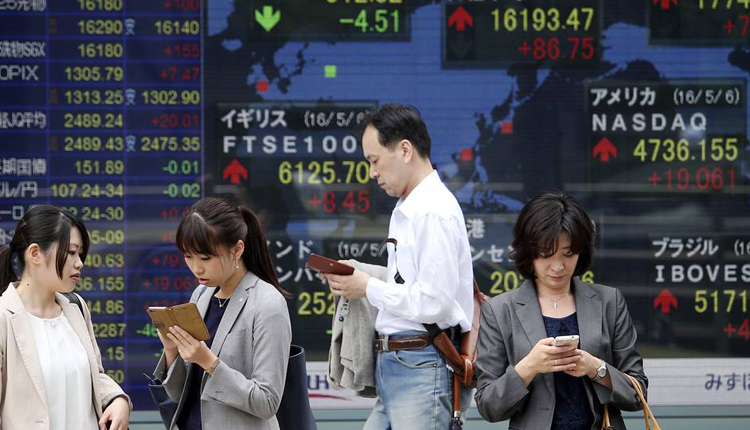Asian stocks struggled for direction in Tuesday afternoon trade as weak economic data in Europe fueled fears of slowing growth.
Shares on mainland China rose by the afternoon, with the Shanghai composite adding 0.77 percent and Shenzhen component gaining 1.08 percent. The Shenzhen composite also rose 1.061 percent.
Meanwhile, Hong Kong’s Hang Seng index advanced 0.32 percent. Shares of Anheuser-Busch InBev’s Asian business were priced at HK$27 apiece, the bottom of the range in the firm’s second attempt at listing in Hong Kong.
In Japan, the Nikkei 225 advanced fractionally despite shares of index heavyweights Fast Retailing and Softbank Group declining 1.14 percent and 1.86 percent, respectively. The Topix index also gained 0.4 percent.
Over in South Korea, the Kospi was 0.19 percent higher. Australia’s S&P/ASX 200 traded slightly higher.
Overall, the MSCI Asia ex-Japan index rose 0.06 percent.
Data released Monday stoked fears of a deteriorating global economic outlook. Manufacturing activity in Germany fell to its lowest level since the financial crisis this month, data from IHS Markit showed. Germany’s services sector also grew at its slowest pace in nine months.
“Given the weak PMIs, it is possible Germany may have entered a mild technical recession in Q3 — something the Bundesbank flagged as a risk in their latest monthly report,” Tapas Strickland, director of economics and markets at National Australia Bank, wrote in a morning note. “Despite this possibility, prospects of fiscal stimulus remain dim.”
Overall, manufacturing in the euro zone fell to a more than six-year low while services grew at its slowest pace in eight months, IHS Markit said.
US-China trade
On the trade front, Chinese importers bought 10 boatloads of U.S. soybeans following last week’s trade negotiations between the two economic powerhouses.
“We still think a proper agreement by say, the middle of next year, seems most likely,” Michael Spencer, chief economist and head of research Asia Pacific at Deutsche Bank, told CNBC’s “Squawk Box” on Tuesday. “Both sides, we think, want an agreement. They just don’t seem to be needing it right now.”
Still, he added, even in the event of a proper deal being reached between Beijing and Washington: “It’s gonna take some time for businesses to be confident that President (Donald) Trump isn’t simply going to threaten to go back on that agreement, you know, two or three months later.”
Overnight on Wall Street, stocks ended the trading day little changed. The Dow Jones Industrial Average gained just 14.92 points to 26,949.99 while the S&P 500 was just below the flatline at 2,991.77. The Nasdaq Composite shed nearly 0.1 percent to 8,112.46.
Currencies and oil
The U.S. dollar index, which tracks the greenback against a basket of its peers, was at 98.663 after touching an earlier low of 98.618.
The Japanese yen traded at 107.52 per dollar after seeing an earlier high of 107.46. The Australian dollar was at $0.6774 following its decline from levels above $0.685 seen last week.
Oil prices slipped in the afternoon of Asian trading hours, with the international benchmark Brent crude futures contract declining 0.59 percent to $64.39 per barrel and U.S. crude futures shedding 0.51 percent to $58.34 per barrel.
Source: CNBC
